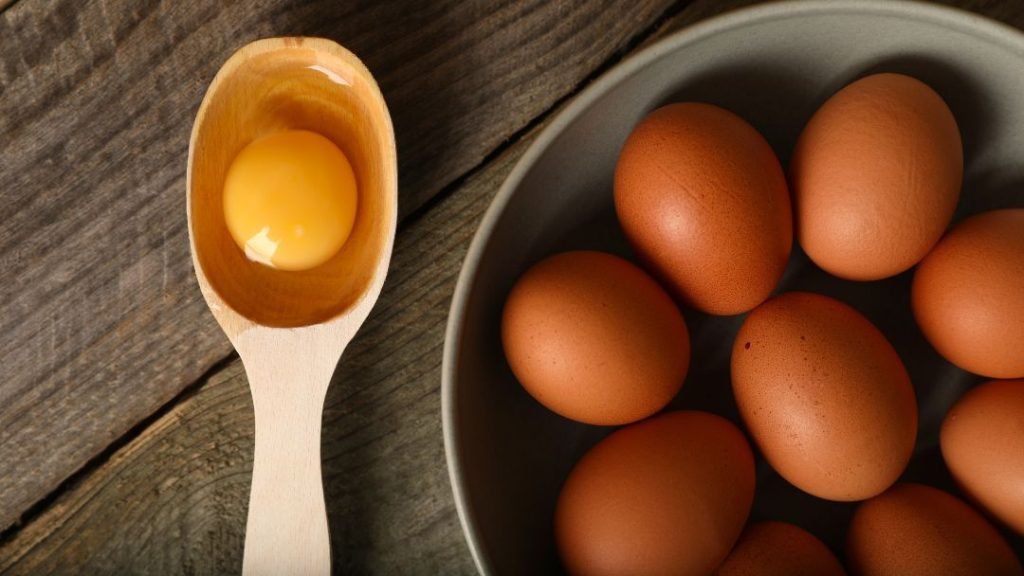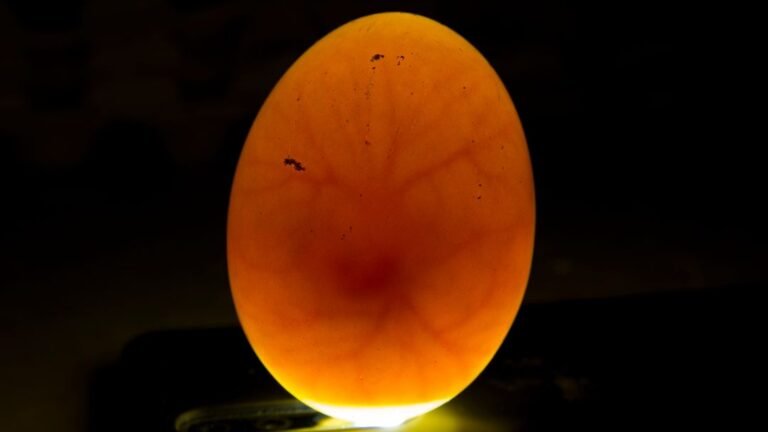Eggs can last and remain fresh for up to four to five weeks. Eggs can be a staple in many households, whether they are used for breakfast, baking, or cooking.
However, it’s important to know how long eggs can last before they become unsafe to eat. Freshness is key when it comes to eggs, as they can spoil and harbor bacteria over time. By understanding the shelf life of eggs, you can ensure you’re using them at their peak freshness.
We will discuss how long eggs last and remain fresh, factors that can affect their shelf life, and ways to determine if an egg is still good to use. So let’s crack into it and find out more about the lifespan of eggs.
Factors That Affect Egg Freshness
Factors such as storage temperature, age of the eggs, and the way they are handled can all impact the freshness and shelf life of eggs. It is important to know how long eggs last to ensure their freshness and safety for consumption.
Eggs are a staple ingredient in many households, but have you ever wondered how long they can actually last before they start to lose their freshness? Various factors come into play when determining the shelf life of eggs, including temperature and storage conditions, egg quality and grade, as well as packaging and handling.
In this blog post, we will take a closer look at each of these factors to help you understand how they affect the freshness of your eggs.
Temperature And Storage Conditions
- Refrigeration is key: Storing eggs in the refrigerator at a consistent temperature of around 35 to 40 degrees Fahrenheit is crucial in maintaining their freshness.
- Avoid temperature fluctuations: Frequent temperature changes can accelerate the aging process of eggs, so it’s best to keep them away from temperature fluctuations caused by leaving them out on the counter or placing them near the refrigerator door.
- Store them in their carton: The original packaging of eggs serves a purpose beyond transportation. It helps protect eggs from absorbing unwanted odors and flavors from the surrounding environment.
- Keep away from strong-smelling foods: Eggs have porous shells, which means they can absorb odors. To maintain their flavor and quality, it’s advisable to store eggs away from strong-smelling foods like onions and garlic.
Egg Quality And Grade
- Freshness matters: The freshness of eggs plays a vital role in how long they will last. Freshly laid eggs will have a firmer egg white and a higher yolk that stands up high. On the other hand, older eggs will have a flatter yolk and a more watery egg white.
- Grade matters too: Eggs are graded based on quality and appearance. Grades A, AA, and B are commonly used, with Grade A being the highest quality. Higher-grade eggs generally last longer and maintain their freshness better due to their superior quality.
Packaging And Handling
- Cracked eggs should be discarded: Cracked eggs provide an entry point for bacteria, and they should never be consumed. If you notice any cracks, it’s best to discard the egg immediately.
- Avoid unnecessary handling: Excessive handling of eggs can lead to damage, which can reduce their shelf life. It’s recommended to handle eggs with care to minimize the risk of breakage.
- Check the expiration date: Always check the expiration or best-before date on the egg carton before purchasing or consuming. Using eggs past their expiration date can result in the loss of freshness and even pose a health risk.
By considering these factors and implementing proper storage and handling practices, you can extend the shelf life of your eggs and ensure that they remain fresh for as long as possible. Remember, when it comes to enjoying the benefits of fresh eggs, taking the right precautionary measures is key.

The Egg Freshness Test
Determining the freshness of eggs is essential for safe consumption. Discover how long eggs typically last before they lose their freshness and learn how to conduct the egg freshness test to ensure you’re using perfect eggs in your recipes.
Conducting The Float Test
To determine the freshness of an egg, you can perform a simple test known as the float test. This method involves placing the egg in a bowl of water and observing whether it sinks or floats. Here’s how to conduct the float test:
- Fill a bowl with water, making sure it’s deep enough to fully submerge an egg.
- Gently place the egg into the water and observe its behavior.
If the egg sinks and lies flat on the bottom of the bowl, it is very fresh and safe to consume. This indicates that the air cell within the egg is small, meaning it hasn’t had much time to deteriorate.
If the egg stands upright on the bottom or tilts slightly, it is still relatively fresh but not as fresh as a flat-lying egg. The air cell is slightly larger, indicating that some time has passed since the egg was laid.
If the egg floats to the surface, it is no longer fresh and should be discarded. As eggs age, the air cell within them expands, causing them to become buoyant.
Interpreting The Results
Now that you’ve conducted the float test, let’s interpret the results based on what you observed during the test:
- If the egg sank and lay flat on the bottom of the bowl, it is extremely fresh and can be used for any culinary purpose.
- If the egg stood upright on the bottom or tilted slightly, it is still fresh but may be better suited for hard-boiling or baking rather than consuming raw.
- If the egg floated to the surface, it is no longer fresh and should not be consumed.
Understanding The Freshness Scale
To better understand the freshness of eggs, a freshness scale is often used. Here’s a breakdown of what each level on the scale signifies:
- Very fresh (Grade AA): The egg is extremely fresh and suitable for any cooking method.
- Fresh (Grade A): The egg is fresh and can be used in most cooking methods, but it may not hold its shape as well as a very fresh egg.
- Fairly fresh (Grade B): The egg is still relatively fresh but might be better suited for hard-boiling or baking rather than use in recipes that require a delicate texture.
- Old (Grade C): The egg is no longer fresh and should not be used for cooking or eating.
By understanding the results of the float test and the freshness scale, you can confidently determine the freshness of your eggs and make informed decisions about their usage in your culinary endeavors.
Proper Egg Storage Tips
Discover effective egg storage tips to keep your eggs fresh for longer. Learn how long eggs can last and the proper methods to store them to maintain their freshness.
Refrigeration Guidelines
Most people store their eggs in the refrigerator to ensure they remain fresh for longer. Here are some guidelines to follow when it comes to refrigerating eggs:
- Store eggs in their original carton: This helps protect them from absorbing odors from other foods in the fridge.
- Keep eggs in the main body of the refrigerator: Avoid storing eggs on the refrigerator door as the temperature fluctuates more there.
- Store eggs at a consistent temperature: The ideal temperature for egg storage is around 35°F to 40°F (1.7°C to 4.4°C).
Should You Wash Eggs?
The question of whether to wash eggs or not often comes up. Here are some considerations to help you make an informed decision:
- Fresh eggs have a natural protective coating called the “bloom”: This coating helps keep out bacteria and moisture, prolonging the egg’s freshness.
- If you plan to refrigerate the eggs, it’s best not to wash them: Washing removes the protective bloom, making the eggs more susceptible to contamination and spoilage.
- If you choose to wash eggs, do it just before using them: Use warm water and mild soap, then rinse thoroughly. Dry them completely before refrigerating.
Storing Eggs In The Fridge Or Pantry
The debate of whether to store eggs in the fridge or pantry is a common one. Here are some guidelines to help you decide:
- If you bought eggs from a refrigerated section, store them in the fridge: Commercially refrigerated eggs should be kept in the refrigerator to maintain their freshness and quality.
- If you have backyard eggs or eggs from local farmers, they may not require refrigeration: These eggs often come unwashed and still have their protective bloom intact. It’s best to consult with the supplier or follow local food safety guidelines.
- If you’re unsure, it’s safer to err on the side of caution and refrigerate the eggs: Refrigeration helps lower the risk of foodborne illnesses by inhibiting the growth of bacteria.
Remember, when it comes to proper egg storage, maintaining a consistent temperature and protecting the eggs’ natural coating are key factors in keeping them fresh for longer.
Extending Egg Freshness
Extending egg freshness is crucial for maintaining their quality. Discover how long eggs last and remain fresh to ensure you maximize their shelf life.
Using Egg Cartons
Using an egg carton can help protect your eggs from cracking and also maintain their freshness for a longer period. Here are some steps to follow:
- Grab an empty egg carton, preferably one that is clean and in good condition.
- Place the egg’s pointed end down into the carton, leaving enough space between each egg.
- Close the carton lid gently, ensuring it is secure but not too tight.
- Store the carton of eggs in the main compartment of your refrigerator, away from odorous food items.
- Remember to rotate the carton occasionally to maintain equal distribution of temperature and humidity.
Adding A Protective Coating
Adding a protective coating to your eggs can help seal the pores on the shell, preventing bacteria from entering and extending their freshness. Here’s how you can do it:
- Prepare a solution of 1 part mineral oil and 10 parts water.
- Gently wipe each egg with the solution, making sure to cover the entire surface.
- Allow the eggs to air dry completely before storing them.
- The protective coating will create a barrier on the shell, enhancing the eggs’ shelf life.
- Remember to use food-grade mineral oil and clean the eggs before consuming them.
Freezing Eggs For Longer Freshness
Freezing eggs is an excellent method to extend their freshness beyond their usual shelf life. Here’s how you can freeze eggs for longer freshness:
- Crack the eggs into a bowl and gently whisk them until well combined.
- Pour the whisked eggs into an ice cube tray, filling each compartment about 3/4 full.
- Place the ice cube tray in the freezer and leave it until the eggs are completely frozen.
- Once frozen, transfer the egg cubes to a freezer-safe container or bag.
- Label the container with the date and store the eggs in the freezer.
- Frozen eggs can be thawed in the refrigerator when needed, and they can last for up to one year.
By following these methods, you can efficiently extend the freshness of your eggs, ensuring that you can enjoy them for a longer time. Implement these practices and make the most out of your eggs!
Using Expired Eggs
Expired eggs can still be utilized in various ways, depending on their freshness and quality. However, it’s important to ensure that they are safe for consumption and appropriate for different cooking and baking purposes. Here are some guidelines and creative ideas for using expired eggs:
Safety Precautions
- Conduct the “float test”: Place the egg in a bowl of water – if it sinks and lies flat, it is fresh; if it stands upright but remains at the bottom, it is a few weeks old but still safe to consume; and if it floats, it is no longer fresh and should be discarded.
- Check for any signs of spoilage such as a foul odor or unusual coloration before using expired eggs.
- Be cautious when using eggs that are very close to or have passed their expiration date, especially if they have not been stored properly. It is better to err on the side of caution and discard them if unsure.
Cooking Vs. Baking With Expired Eggs
- Cooking with expired eggs: In recipes where eggs are cooked thoroughly, such as scrambled eggs, frittatas, or quiches, expired eggs can still be utilized as long as they pass the float test. The heat applied during cooking will kill any potential bacteria.
- Baking with expired eggs: For recipes that rely on egg leavening or structure, it is safer to use fresh eggs. Expired eggs may not provide the desired results as their structural properties tend to deteriorate over time. However, they can still be used in recipes that call for eggs as a minor ingredient or for moisture.
Creative Ways To Use Expired Eggs
- Egg wash: Whip up expired eggs and use them as a glaze or to give a shiny finish to bread, pastries, or cookies.
- Homemade hair mask: Combine egg yolks from expired eggs with other natural ingredients like olive oil or honey for a nourishing hair treatment.
- Natural fertilizer: Crush and mix expired eggs with soil for a nutrient-rich addition to your garden.
- Bird food: Crush the shells of expired eggs and scatter them in your backyard as a calcium-rich treat for birds.
Remember, the freshness and quality of eggs play a crucial role in their usability and safety. When in doubt, it’s best to discard expired eggs rather than risk any potential health issues.
The Shelf Life Of Different Egg Types
The shelf life of different egg types varies, with fresh eggs lasting the longest. Proper storage can extend their freshness, ensuring they remain edible for weeks or even months. Understanding how long eggs last can help prevent waste and ensure safe consumption.
Fresh Eggs
- Fresh eggs are the most common type of eggs found in grocery stores and are typically consumed within a few weeks of being laid.
- These eggs are usually laid by chickens confined to battery cages or free-range environments.
- They have a longer shelf life compared to other types of eggs due to their protective cuticle, a thin, transparent coating on the eggshell that acts as a natural barrier against bacteria and oxygen.
- Fresh eggs can be stored in the refrigerator for up to 4-5 weeks from the date of laying.
- To check if an egg is fresh, you can perform the float test: Place the egg in a bowl of water, and if it sinks horizontally or slightly towards the bottom, it is still fresh.
Organic Eggs
- Organic eggs are produced by chickens that are raised following specific organic farming practices.
- These chickens are provided with organic feed and have access to the outdoors, allowing them to forage for natural food sources.
- Organic eggs have a similar shelf life as fresh eggs, lasting up to 4-5 weeks when properly stored in the refrigerator.
- The main difference between organic and fresh eggs lies in the farming methods used and the feed given to the chickens.
- Organic eggs are often preferred by consumers who value environmentally friendly and sustainable farming practices.
Pasture-Raised Eggs
- Pasture-raised eggs are laid by chickens that spend the majority of their time foraging on pastures, where they have access to a diverse range of plants, insects, and worms.
- These chickens are not confined to cages and have ample space to roam freely.
- Pasture-raised eggs often have a vibrant orange or golden yolk, indicating a higher nutrient content compared to conventional eggs.
- Due to their natural diet and active lifestyle, pasture-raised eggs tend to have a shorter shelf life and are best consumed within 2-3 weeks from the date of laying.
- Although the shelf life is shorter, pasture-raised eggs are renowned for their superior taste and nutritional value.
Fresh eggs, organic eggs, and pasture-raised eggs differ in terms of farming practices, feed, and shelf life. Fresh and organic eggs can be stored for up to 4-5 weeks, while pasture-raised eggs should be consumed within 2-3 weeks for optimal freshness.
Choose the type that suits your preferences and enjoy the goodness of these farm-fresh delights!
Signs Of Spoiled Eggs
Eggs are a common staple in most kitchens, but how do you know if they have gone bad? It’s important to recognize the signs of spoiled eggs to ensure you’re consuming safe and fresh ones.
Here are some visual indicators, a smell test, and the method of cracking open the egg that can help you determine if an egg has gone bad:
Visual Indicators
- Mold or fungus growth on the eggshell: If you notice any green, black, or white powdery substance on the eggshell, it’s a clear sign that the egg is no longer fresh.
- Discolored or cloudy egg white: Instead of the translucent white appearance, a spoiled egg may have a pink, greenish, or yellowish tinge. Additionally, the egg white may appear thicker and not flow easily as it should.
- Unusual texture: Fresh eggs have a smooth and consistent texture. On the other hand, a spoiled egg may have lumpy or slimy whites, or the yolk might be runny instead of holding its shape.
Smell Test
- Foul odor: Whenever you crack open an egg, take a whiff of its contents. A fresh egg should have a neutral or slightly earthy smell. If you detect a strong sulfur or rotten odor, it’s a clear indication of spoilage.
Cracking Open The Egg
- Spreading or runny yolk: When you crack open a fresh egg, the yolk should be round and firm. A spoiled egg may have a runny yolk, which is a sign that it has deteriorated.
- Unpleasant or off-putting smell: As mentioned earlier, a bad egg will emit a foul odor as soon as it is cracked open.
Remember, consuming spoiled eggs can lead to foodborne illnesses, so it’s crucial to discard any eggs that show signs of spoilage. By paying attention to visual indicators, performing a smell test, and checking the egg’s consistency, you can ensure that you are only using fresh and safe eggs in your culinary endeavors.
Egg Safety And Avoiding Foodborne Illnesses
Eggs are a versatile and nutritious food enjoyed by many. However, it’s important to handle and cook eggs properly to ensure food safety and avoid foodborne illnesses. Salmonella contamination is a major concern when it comes to eggs.
Additionally, certain individuals, such as pregnant women, young children, and the elderly, are considered high-risk and require extra caution when consuming eggs.
Proper Egg Handling And Cooking Techniques
To minimize the risk of foodborne illnesses associated with eggs, it is crucial to follow proper egg handling and cooking techniques. Here are some guidelines to keep in mind:
- Always store eggs in the refrigerator at a temperature of 40°F (4°C) or below.
- Wash hands thoroughly before and after handling eggs.
- Check eggs for any cracks or unusual odors before using them.
- Use eggs within their expiration date for maximum freshness and safety.
- When preparing recipes that require raw or undercooked eggs, consider using pasteurized eggs to eliminate the risk of Salmonella contamination.
- Wash all utensils and surfaces that come into contact with raw eggs, such as cutting boards and knives, with warm soapy water.
- Cook eggs thoroughly until both the yolk and white are firm to kill any potential bacteria. Avoid consuming dishes with runny eggs or raw egg products unless they are made with pasteurized eggs.
- Refrigerate cooked eggs promptly if you don’t consume them immediately.
Recognizing Salmonella Contamination
Salmonella is a bacteria commonly associated with raw eggs and poultry. It can cause food poisoning and lead to unpleasant symptoms such as nausea, vomiting, abdominal pain, and diarrhea. Here are some signs that may indicate the presence of Salmonella contamination:
- Unusual appearance or texture of the egg, such as a slimy or discolored shell.
- Foul or sulfur-like smell coming from the egg.
- Abnormalities in the egg’s yolk or whites, such as a greenish ring around the yolk or a cloudy appearance.
- Digestive discomfort or illness after consuming raw or undercooked eggs.
If you suspect that an egg is contaminated with Salmonella, it’s best to discard it and thoroughly clean any utensils or surfaces that came into contact with it.
Egg Safety For High-Risk Individuals
Certain individuals, including pregnant women, young children, the elderly, and those with weakened immune systems, are at higher risk for foodborne illnesses. It’s important to take extra precautions when it comes to egg safety for these vulnerable populations:
- Avoid consuming raw or undercooked eggs, including dishes like homemade mayonnaise or Caesar salad dressing that contain uncooked eggs.
- Choose pasteurized egg products or recipes that involve thoroughly cooked eggs for high-risk individuals.
- Pregnant women should opt for pasteurized egg products in desserts like mousse or custard to avoid potential risks.
- Ensure that eggs used in recipes for infants and young children are fully cooked to minimize the risk of Salmonella exposure.
By following these guidelines and practicing proper egg handling and cooking techniques, you can enjoy eggs safely and reduce the risk of foodborne illnesses for yourself and those around you. Stay informed and prioritize safety when it comes to eggs in your culinary endeavors.
Conclusion
Understanding how long eggs last and remain fresh is essential for ensuring food safety and maintaining quality in our daily cooking. By following proper storage practices and paying attention to expiration dates, we can optimize the freshness and taste of this versatile ingredient.
As mentioned earlier, eggs can be safely consumed even after the listed expiration date, as long as they pass the freshness test. Remember to use the float test or check for any signs of spoilage before cooking or consuming eggs.
While refrigeration is a key factor in extending their shelf life, it’s important to note that eggs should always be stored in their original carton, to prevent exposure to unwanted odors and bacteria. By adopting these simple yet effective guidelines, we can confidently enjoy the many benefits of eggs in our favorite dishes, while minimizing waste and maintaining food safety.




